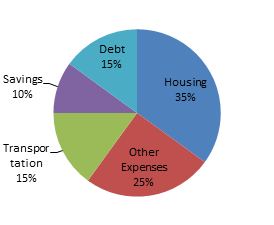Why Budget?
 Budgeting is the key to making limited funds last, avoiding financial missteps and reaching financial goals. It’s easy to find yourself in trouble if you don’t have a financial plan. Being aware of your income and monitoring your spending is empowering! It will help you make informed choices about what you can afford and to set realistic goals for future expenses.
Budgeting is the key to making limited funds last, avoiding financial missteps and reaching financial goals. It’s easy to find yourself in trouble if you don’t have a financial plan. Being aware of your income and monitoring your spending is empowering! It will help you make informed choices about what you can afford and to set realistic goals for future expenses.
Creating a budget begins with an assessment of your resources and your financial obligations.
Budgeting does not have to be complicated or overwhelming. It’s likely you already have access to formatted templates on your computer that make it easy to get started. The National Association of State Treasurers(NAST) offers several budgeting worksheets as well as tips and tools on budgeting. In addition to budgeting, you will find helpful resources on dozens of financial topics, including behavioral finance and managing financial stress. Your bank may offer budgeting tools and apps, which may be especially helpful if you pay bills directly through your bank. You may even prefer to track your budget in a notebook. Whichever way you decide to set up your budget, the most important thing is that you create one, monitor it and make adjustments to live within your means.
Online budget and financial literacy resource: http://www.360financialliteracy.org/Calculators/Student-Budget .
Budget Check
- Assess your resources
Add up your resources. Include the amount of financial aid you’ll receive for living expenses, income from work, money in the bank and any other resources you have or expect to receive. - Assess your expenses
Add up your expenses. A typical budget includes standard monthly expenses. You must also factor in any non-standard expenses that do not occur monthly, such as car registration or other annual obligations or purchases. - Write it down
This exercise will give you an idea of what you really spend. For a period of time (at least two weeks during your regular routine), write down everything you spend. Include every purchase, small and large. A review of your debit card/checking account/credit card statements can also help you identify spending patterns. - Know where you stand
Hopefully, you will find that your resources will meet your expenses. If your expenses exceed your resources, you must decrease your expenses or increase your resources. Cutting expenses is often required to balance a budget. - Be realistic
Most people, especially students, must limit their purchases and activities. Living on a fixed budget doesn’t mean you can never have any fun, but knowing your financial limits, will make it easier to seek alternative opportunities and rule out activities or expenses that will negatively impact your finances. In addition to free campus activities, students are often eligible for discounts or free admission to museums. - Beware of plastic
It may be tempting to supplement a budget shortfall by using a credit card, but doing so can be a risky, short-term “fix,” unless it’s an emergency and you have a plan for paying off the balance quickly.